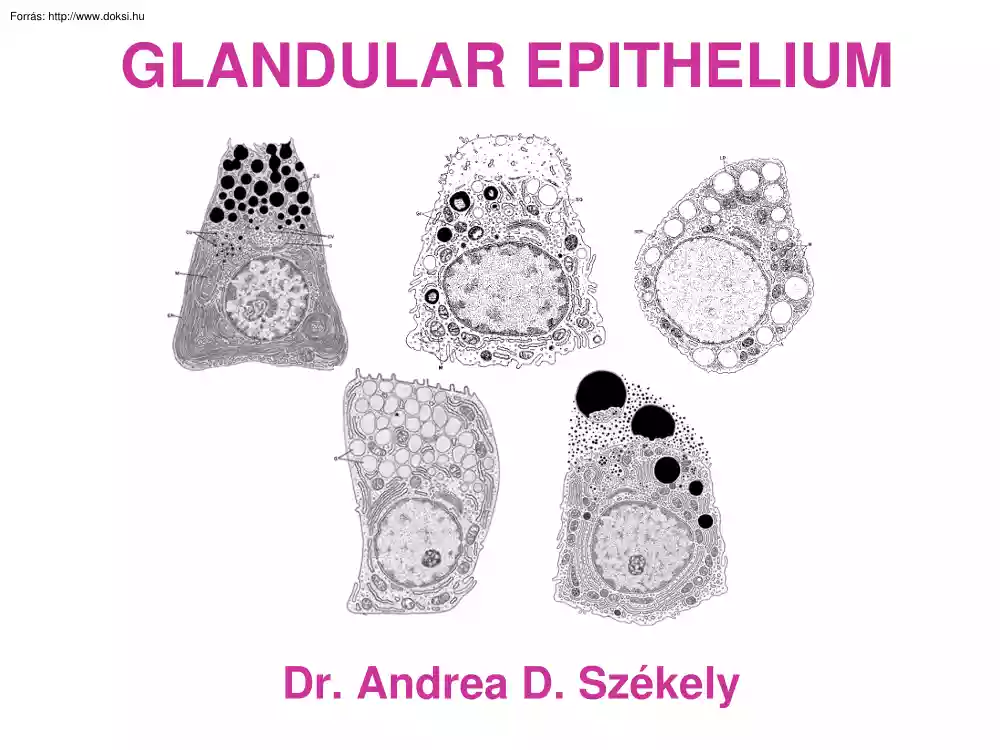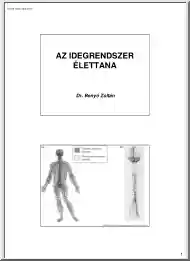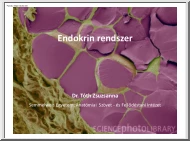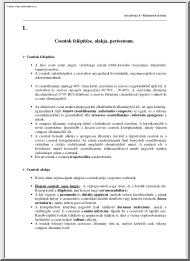A doksi online olvasásához kérlek jelentkezz be!

A doksi online olvasásához kérlek jelentkezz be!
Nincs még értékelés. Legyél Te az első!
Tartalmi kivonat
GLANDULAR EPITHELIUM Dr. Andrea D Székely CLASSIFICATION OF GLANDS • EPITHELIAL SPECIALISATION FOR SECRETION • A PATCH OF EPITHELIAL CELLS (INTERNAL SURFACE) OR A DOWNGROWTH THAT PROLIFERATES (EXTERNAL SURFACE) • MICROSCOPIC, PART OF AN ORGAN OR • AN ORGAN BY ITSELF • CONNECTIVE TISSUE FRAMEWORK GLANDULAR EPITHELIA Exocrine glands Secrete through ducts onto the surface of the gland Endocrine glands Release hormones into surrounding fluid (blood flow) CLASSIFICATION ACCORDING TO SECRETIONAL TYPES • Merocrine (product released through exocytosis) Cells of the gland are unaltered • Ex: Eccrine sweat glands, salivary glands • Apocrine (involves the loss of both product and cytoplasm) • Ex: Mammary glands, prostate, scent glands • Holocrine (destroys the cell) • Ex: Sebaceous glands MECHANISMS OF GLANDULAR SECRETION Figure 4.6 MORPHOLOGICAL TYPES UNICELLULAR Individual secretory cells (goblet cells) MULTICELLULAR Organs containing
glandular epithelium (large glands, crypts) TUBULO- TUBULOTUBULAR ACINAR ALVEOLAR SIMPLE SIMPLE BANCHING COMPOUND ALVEOLAR SEROUS AND MUCOUS ACINI THE SEROUS / MUCOUS DISTINCTION IS BASED ON THE CELL'S PRODUCT SEROUS, LIKE SERUM - CLEAR, WATERY SOLUTION OF ENZYMES MUCOUS, LIKE MUCUS - GLYCOPROTEIN MIXTURE MIXED glands (most salivary glands) contain both types of cells (many serous demilunes) SEROUS glands (e.g, parotid gland or pancreas) MUCOUS glands (e.g, Brunner's glands) SEROUS SECRETORY CELLS TYPICAL ACINUS (UNIT) TUBULOALVEOLAR small lumen round nuclei well stained cytoplasm THE CYTOPLASM IS POLARIZED BASAL CYTOPLASM – basophilic due to protein synthetic organelles (ribosomes on rough endoplasmic reticulum APICAL CYTOPLASM - variouslystaining secretory vesicles (zymogen granules) The Golgi apparatus is usually located midway along the cell, typically in a supranuclear position. SEROUS SECRETORY CELLS TYPICAL ACINUS (UNIT) COILED TUBULAR wide lumen
round nuclei well stained cytoplasm THE CYTOPLASM IS POLARIZED TYPICAL SEROUS ACINUS!!! Long excretory portion Opens onto the external surface MUCOUS SECRETORY CELLS TYPICAL ACINUS (UNIT) wide lumen flat nuclei poorly stained cytoplasm THE CYTOPLASM IS POLARIZED MUCOUS CELLS - "empty" appearance BASAL CYTOPLASM – nucleus and rest of cell organelles MIDDLE and APICAL CYTOPLASM – large secretory granules Mucus does not stain well with standard acidic or basic dyes, but is demonstrated with the Periodic Acid Shiff procedure (PAS stain). UNICELLULAR MUCOUS GLAND GOBLET CELLS : scattered among enterocytes within the epithelium of the small intestine and colon, respiratory and reproductive tracts. They secrete MUCUS, which facilitates passage of material. The name "goblet" refers to the cell's shape, narrow at the base and bulging apically. The apical end of each goblet cell is occupied by a large mass of mucus, which compresses adjacent cells and
displaces the nucleus toward the basal end of the cell. As in other mucous cells, the nucleus is compact and intensely-stained. Goblet cells comprise an integral part of the epithelium, attached by junctional complexes (evidenced in light microscopy as the "terminal bar") to adjacent absorptive cells. The proportion of goblet cells to absorptive cells increases along the entire length of the bowel, with relatively few in the duodenum and very many in the colon. APOCRINE SECRETION 1. APOCRINE SWEAT GLANDS open into hair follicles Large glands FOUND: axillae, perineum, and areolae mammae (phylogenetic remnant of the mammalian sexual scent gland; the sweat is initially odorless upon production. It is only after skin's bacteria has acted upon the apocrine sweat that it develops an odor) APOCRINE SECRETION 2. TYPICAL ACINUS (UNIT) wide lumen oval nuclei light staining in cytoplasm MAMMARY GLAND NON-LACTATING THE CYTOPLASM IS POLARIZED APOCRINE CELLS - irregular
height (torn luminal surface) BASAL CYTOPLASM – nucleus + cell organelles MIDDLE and APICAL CYTOPLASM – large secretory granules (extreme exocytotic procedure- the upper part maybe missing) PROSTATE PSEUDO-APOCRINE LACTATING HOLOCRINE SECRETION TYPICAL ACINUS (UNIT) no lumen round nuclei light / no staining in cytoplasm THE CYTOPLASM IS NOT POLARIZED HOLOCRINE CELLS - gradually age and die round cells with lipid-filled vacuoles branched acini join at short duct duct empties into hair follicle Associated with hair follicles in hair covered areas Independent of hair follicles at mucosal margins (lips, eyelids, penis, labia minora, nipples) Secretes oily substance (sebum) onto hair to waterproof hair and skin STRUCTURES AIDING SECRETION MYOEPITHELIAL CELLS ACTIN STAINING MYOEPITHELIAL MUSCLE BUNDLES
glandular epithelium (large glands, crypts) TUBULO- TUBULOTUBULAR ACINAR ALVEOLAR SIMPLE SIMPLE BANCHING COMPOUND ALVEOLAR SEROUS AND MUCOUS ACINI THE SEROUS / MUCOUS DISTINCTION IS BASED ON THE CELL'S PRODUCT SEROUS, LIKE SERUM - CLEAR, WATERY SOLUTION OF ENZYMES MUCOUS, LIKE MUCUS - GLYCOPROTEIN MIXTURE MIXED glands (most salivary glands) contain both types of cells (many serous demilunes) SEROUS glands (e.g, parotid gland or pancreas) MUCOUS glands (e.g, Brunner's glands) SEROUS SECRETORY CELLS TYPICAL ACINUS (UNIT) TUBULOALVEOLAR small lumen round nuclei well stained cytoplasm THE CYTOPLASM IS POLARIZED BASAL CYTOPLASM – basophilic due to protein synthetic organelles (ribosomes on rough endoplasmic reticulum APICAL CYTOPLASM - variouslystaining secretory vesicles (zymogen granules) The Golgi apparatus is usually located midway along the cell, typically in a supranuclear position. SEROUS SECRETORY CELLS TYPICAL ACINUS (UNIT) COILED TUBULAR wide lumen
round nuclei well stained cytoplasm THE CYTOPLASM IS POLARIZED TYPICAL SEROUS ACINUS!!! Long excretory portion Opens onto the external surface MUCOUS SECRETORY CELLS TYPICAL ACINUS (UNIT) wide lumen flat nuclei poorly stained cytoplasm THE CYTOPLASM IS POLARIZED MUCOUS CELLS - "empty" appearance BASAL CYTOPLASM – nucleus and rest of cell organelles MIDDLE and APICAL CYTOPLASM – large secretory granules Mucus does not stain well with standard acidic or basic dyes, but is demonstrated with the Periodic Acid Shiff procedure (PAS stain). UNICELLULAR MUCOUS GLAND GOBLET CELLS : scattered among enterocytes within the epithelium of the small intestine and colon, respiratory and reproductive tracts. They secrete MUCUS, which facilitates passage of material. The name "goblet" refers to the cell's shape, narrow at the base and bulging apically. The apical end of each goblet cell is occupied by a large mass of mucus, which compresses adjacent cells and
displaces the nucleus toward the basal end of the cell. As in other mucous cells, the nucleus is compact and intensely-stained. Goblet cells comprise an integral part of the epithelium, attached by junctional complexes (evidenced in light microscopy as the "terminal bar") to adjacent absorptive cells. The proportion of goblet cells to absorptive cells increases along the entire length of the bowel, with relatively few in the duodenum and very many in the colon. APOCRINE SECRETION 1. APOCRINE SWEAT GLANDS open into hair follicles Large glands FOUND: axillae, perineum, and areolae mammae (phylogenetic remnant of the mammalian sexual scent gland; the sweat is initially odorless upon production. It is only after skin's bacteria has acted upon the apocrine sweat that it develops an odor) APOCRINE SECRETION 2. TYPICAL ACINUS (UNIT) wide lumen oval nuclei light staining in cytoplasm MAMMARY GLAND NON-LACTATING THE CYTOPLASM IS POLARIZED APOCRINE CELLS - irregular
height (torn luminal surface) BASAL CYTOPLASM – nucleus + cell organelles MIDDLE and APICAL CYTOPLASM – large secretory granules (extreme exocytotic procedure- the upper part maybe missing) PROSTATE PSEUDO-APOCRINE LACTATING HOLOCRINE SECRETION TYPICAL ACINUS (UNIT) no lumen round nuclei light / no staining in cytoplasm THE CYTOPLASM IS NOT POLARIZED HOLOCRINE CELLS - gradually age and die round cells with lipid-filled vacuoles branched acini join at short duct duct empties into hair follicle Associated with hair follicles in hair covered areas Independent of hair follicles at mucosal margins (lips, eyelids, penis, labia minora, nipples) Secretes oily substance (sebum) onto hair to waterproof hair and skin STRUCTURES AIDING SECRETION MYOEPITHELIAL CELLS ACTIN STAINING MYOEPITHELIAL MUSCLE BUNDLES



